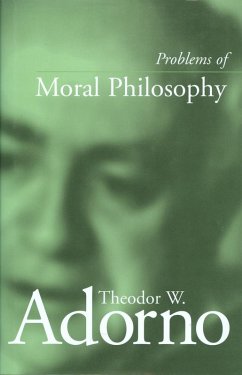Problems of Moral Philosophy (eBook, PDF)
Sofort per Download lieferbar

Problems of Moral Philosophy (eBook, PDF)
- Format: PDF
- Merkliste
- Auf die Merkliste
- Bewerten Bewerten
- Teilen
- Produkt teilen
- Produkterinnerung
- Produkterinnerung

Hier können Sie sich einloggen

Bitte loggen Sie sich zunächst in Ihr Kundenkonto ein oder registrieren Sie sich bei bücher.de, um das eBook-Abo tolino select nutzen zu können.
This volume makes Adorno's lectures on the problems of moral philosophy available for the first time to English-speaking readers. It is one of several volumes of Adorno's unpublished writings which are currently being published in Germany, and which will be published in translation by Polity. The book is organized around an account of Kant's moral theory, and introduces most of the central topics of Adorno's far more difficult work Negative Dialectics. He examines concepts such as the primacy of practical reason, the relation between freedom and experience, and the desubstantialization of…mehr
- Geräte: PC
- mit Kopierschutz
- eBook Hilfe
- Größe: 3MB
![Philosophy and Sociology: 1960 (eBook, PDF) Philosophy and Sociology: 1960 (eBook, PDF)]() Theodor W. AdornoPhilosophy and Sociology: 1960 (eBook, PDF)19,99 €
Theodor W. AdornoPhilosophy and Sociology: 1960 (eBook, PDF)19,99 €![Problems of Moral Philosophy (eBook, ePUB) Problems of Moral Philosophy (eBook, ePUB)]() Theodor W. AdornoProblems of Moral Philosophy (eBook, ePUB)21,99 €
Theodor W. AdornoProblems of Moral Philosophy (eBook, ePUB)21,99 €![There Is No Such Thing as Cultural Identity (eBook, PDF) There Is No Such Thing as Cultural Identity (eBook, PDF)]() François JullienThere Is No Such Thing as Cultural Identity (eBook, PDF)15,99 €
François JullienThere Is No Such Thing as Cultural Identity (eBook, PDF)15,99 €![Not Saved (eBook, PDF) Not Saved (eBook, PDF)]() Peter SloterdijkNot Saved (eBook, PDF)20,99 €
Peter SloterdijkNot Saved (eBook, PDF)20,99 €![Autonomy (eBook, PDF) Autonomy (eBook, PDF)]() Beate RoesslerAutonomy (eBook, PDF)19,99 €
Beate RoesslerAutonomy (eBook, PDF)19,99 €![Möglichkeit (eBook, PDF) Möglichkeit (eBook, PDF)]() Gösta GantnerMöglichkeit (eBook, PDF)0,00 €
Gösta GantnerMöglichkeit (eBook, PDF)0,00 €![Capitalism (eBook, PDF) Capitalism (eBook, PDF)]() Nancy FraserCapitalism (eBook, PDF)18,99 €
Nancy FraserCapitalism (eBook, PDF)18,99 €-
-
-
Dieser Download kann aus rechtlichen Gründen nur mit Rechnungsadresse in A, B, BG, CY, CZ, D, DK, EW, E, FIN, F, GR, HR, H, IRL, I, LT, L, LR, M, NL, PL, P, R, S, SLO, SK ausgeliefert werden.
- Produktdetails
- Verlag: John Wiley & Sons
- Seitenzahl: 232
- Erscheinungstermin: 5. November 2014
- Englisch
- ISBN-13: 9780745692609
- Artikelnr.: 43136725
- Verlag: John Wiley & Sons
- Seitenzahl: 232
- Erscheinungstermin: 5. November 2014
- Englisch
- ISBN-13: 9780745692609
- Artikelnr.: 43136725
- Herstellerkennzeichnung Die Herstellerinformationen sind derzeit nicht verfügbar.
1. Moral Philosophy as a Theoretical Discipline.
2. The Concept of Practice.
3. Theory as Resistance and a 'Testing of Reality' Against Practicism.
4. Naivety and Reflection.
5. On the Tension between Theory and Practice.
6. Spontaneity and Resistance.
7. The Irrational.
8. Hostility to Moralities Confined to Particulars.
9. Ethics as Bad Conscience: on Behalf of a Morality Bluntly Incompatible
with Our Experience.
Part II:.
10. 'Morality and its Discontents'.
11. The Problem of Ethos and Personality.
12. The Ethical is no Natural Category.
13. Morality and Social Crisis.
14. The Sociology of the Repressive Character.
15. The General and the Particular.
16. Plan of the Lecture Course.
17. Texts to Be Studied.
Part III:.
18. Arguments ad homines.
19. Lectures: Attempts at Critical Models.
20. The Dual Nature of Reason in Kant: Theory and Practice, Epistemology
and Metaphysics.
21. The Problem of Freedom.
22. On the Theory of Antimonies.
23. Dialectics.
24. The Distinction between Scepticism and 'The Sceptical Method'.
Part IV:.
25. The Nature of the Antinomies.
26. Causality and Freedom: Spontaneity.
27. The Thesis of the Third Antinomy.
28. The Proof of the Thesis.
29. The Motif of a Causality Born of Freedom.
30. The Antithesis.
Part V:.
31. The Principle of Causality and the Necessity of the Antinomies.
32. Dialectics in Kant and Hegel.
33. Problem of the prima philsophia: The First Cause.
34. Causality, Law and Freedom.
35. External Nature of the Concept of Causality; Freedom as a Given.
Summary: Causality born of freedom.
Part VI:.
36.The Dual Character of Kantian Philosophy.
37. The One and the Many.
38. Once Again: Theory and Practice.
39. On the Doctrine of Method: The Nature of Reason.
40. Speculation.
41. Freedom and the Domination of Nature.
42. The Disappointing of Metaphysical Expectations.
43. The Rejection of Philosophical Indifference.
44. The Idea of God and the Rights of Criticism.
45. The Priority of Practice.
Part VII:.
46. Theory and Practice of the 'Doctrine of Method'.
47. Form and Content in Practical Philosophy.
48. Practice as the Exclusion of Experience.
49. Freedom as Reason.
50. What is Primary and What is Secondary?.
51. The Moral Law as a Given.
52. Can Social Contradictions be Resolved?.
53. Bourgeois Optimism.
54. Can the Moral Law be Learnt Through Experience?.
Part VIII:.
55. Difficulty of Distinguishing Between a Priori Knowledge and Knowledge
from Experience.
56. Necessity and Universality: A 'Second-Order Given'.
57. The Coercive Character of Empirically Given Morality.
58. Psychoanalytical Objection.
59. The Ethics of Conviction.
60. The Return of Teleology.
61. The Element of Heteronomy.
Part IX: .
62. Laws of Freedom.
63. The Principle of Exegesis.
64. The 'Extinction Ofintention'.
65. The Dual Character of Nature.
66. Kant 'Breaks off' the Argument.
67. Resistance to and Acceptance of Heteronomy.
68. The Element of the Absurd.
69. The Historical Dialectics of Morality.
70. The 'Growing Old of Morality'.
Part X: .
71. The Intolerable Dualism of Freedom and Law.
72. The Protestant Tradition.
73. The Experience of Spirit and Nature as Opposed to Domination.
74. Methodological Excursus: Literal Interpretation Versus the History of
Ideas.
75. Kantian Ethics is the Moral Philosophy Par Excellence.
76. Formalism and Rigorism.
Part XI: .
77. The Grounding of Morality in Reason: Against 'the Education of the
Heart';Prince Hamlet.
78. The Element of Non-Identity.
79. Coercion by a Third Party.
80. Reason Aspractice.
81. The Restricted Nature of Kantian Ethics.
82. Bourgeois Calculus and Bureaucratic Virtue.
83. The Ambivalence of the Unmediatedgood.
84. Autonomy and Heteronomy.
Part XII: .
85. Self-Determination.
86. No Cult of Values.
87. The Absence of Balance between Freedom and Law.
88. Formalism and Social Context; Kant's Writings on Moral Philosophy.
89. The Groundwork of the Metaphysic of Morals.
Part XIII:.
90. Excursus on Phenomenology:.
91. The Concept of the Will.
92. Psychological Aspect: Good Will and Ill Will.
93. Duty and Reverence.
94. The Element of Repression.
95. The Disappearance of Freedom.
96. Transition to the Problem of an Ethics of Responsibility and
Conviction.
Part XIV: .
97. The Suppression of Instinct as the General Philosophical Attitude.
98. Self-Preservation and Compensation.
99. The Fetishization of Renunciation.
100. The Idea of Humanity: A Hypothesis.
101. The Totalitarianism of Ends.
102. Reason as an End in Itself.
Part XV: .
103. Kant's Ethics of Conviction [Gesinnung].
104. War on Two Fronts: Against Empiricism and Theology.
105. Difference from Plato : The Idealism of Reason.
106. Early Bourgeois Pathos and Rousseauism.
107. Interiority and the German misSre.
Part XVI:.
108. The Dialectical Element of Morality.
109. Excursus: Ibsen's Wild Duck.
200. Conscience: 'Can Be Very Hard'.
201. Explication: Entanglement in Existing Reality.
202. The Critique of Hegel's Sublation [Aughebung] of Morality.
Part XVII: .
203. Resistance to a False Life.
204. Fallibility in the Face of the Masks of Evil.
205. Contra Nietzsche's Critique of Morality.
206. The Limits of Morality as the Crisis of Indivualism.
207. Transition from Critique to Political Consciousness.
Editor's Notes.
Index.
1. Moral Philosophy as a Theoretical Discipline.
2. The Concept of Practice.
3. Theory as Resistance and a 'Testing of Reality' Against Practicism.
4. Naivety and Reflection.
5. On the Tension between Theory and Practice.
6. Spontaneity and Resistance.
7. The Irrational.
8. Hostility to Moralities Confined to Particulars.
9. Ethics as Bad Conscience: on Behalf of a Morality Bluntly Incompatible
with Our Experience.
Part II:.
10. 'Morality and its Discontents'.
11. The Problem of Ethos and Personality.
12. The Ethical is no Natural Category.
13. Morality and Social Crisis.
14. The Sociology of the Repressive Character.
15. The General and the Particular.
16. Plan of the Lecture Course.
17. Texts to Be Studied.
Part III:.
18. Arguments ad homines.
19. Lectures: Attempts at Critical Models.
20. The Dual Nature of Reason in Kant: Theory and Practice, Epistemology
and Metaphysics.
21. The Problem of Freedom.
22. On the Theory of Antimonies.
23. Dialectics.
24. The Distinction between Scepticism and 'The Sceptical Method'.
Part IV:.
25. The Nature of the Antinomies.
26. Causality and Freedom: Spontaneity.
27. The Thesis of the Third Antinomy.
28. The Proof of the Thesis.
29. The Motif of a Causality Born of Freedom.
30. The Antithesis.
Part V:.
31. The Principle of Causality and the Necessity of the Antinomies.
32. Dialectics in Kant and Hegel.
33. Problem of the prima philsophia: The First Cause.
34. Causality, Law and Freedom.
35. External Nature of the Concept of Causality; Freedom as a Given.
Summary: Causality born of freedom.
Part VI:.
36.The Dual Character of Kantian Philosophy.
37. The One and the Many.
38. Once Again: Theory and Practice.
39. On the Doctrine of Method: The Nature of Reason.
40. Speculation.
41. Freedom and the Domination of Nature.
42. The Disappointing of Metaphysical Expectations.
43. The Rejection of Philosophical Indifference.
44. The Idea of God and the Rights of Criticism.
45. The Priority of Practice.
Part VII:.
46. Theory and Practice of the 'Doctrine of Method'.
47. Form and Content in Practical Philosophy.
48. Practice as the Exclusion of Experience.
49. Freedom as Reason.
50. What is Primary and What is Secondary?.
51. The Moral Law as a Given.
52. Can Social Contradictions be Resolved?.
53. Bourgeois Optimism.
54. Can the Moral Law be Learnt Through Experience?.
Part VIII:.
55. Difficulty of Distinguishing Between a Priori Knowledge and Knowledge
from Experience.
56. Necessity and Universality: A 'Second-Order Given'.
57. The Coercive Character of Empirically Given Morality.
58. Psychoanalytical Objection.
59. The Ethics of Conviction.
60. The Return of Teleology.
61. The Element of Heteronomy.
Part IX: .
62. Laws of Freedom.
63. The Principle of Exegesis.
64. The 'Extinction Ofintention'.
65. The Dual Character of Nature.
66. Kant 'Breaks off' the Argument.
67. Resistance to and Acceptance of Heteronomy.
68. The Element of the Absurd.
69. The Historical Dialectics of Morality.
70. The 'Growing Old of Morality'.
Part X: .
71. The Intolerable Dualism of Freedom and Law.
72. The Protestant Tradition.
73. The Experience of Spirit and Nature as Opposed to Domination.
74. Methodological Excursus: Literal Interpretation Versus the History of
Ideas.
75. Kantian Ethics is the Moral Philosophy Par Excellence.
76. Formalism and Rigorism.
Part XI: .
77. The Grounding of Morality in Reason: Against 'the Education of the
Heart';Prince Hamlet.
78. The Element of Non-Identity.
79. Coercion by a Third Party.
80. Reason Aspractice.
81. The Restricted Nature of Kantian Ethics.
82. Bourgeois Calculus and Bureaucratic Virtue.
83. The Ambivalence of the Unmediatedgood.
84. Autonomy and Heteronomy.
Part XII: .
85. Self-Determination.
86. No Cult of Values.
87. The Absence of Balance between Freedom and Law.
88. Formalism and Social Context; Kant's Writings on Moral Philosophy.
89. The Groundwork of the Metaphysic of Morals.
Part XIII:.
90. Excursus on Phenomenology:.
91. The Concept of the Will.
92. Psychological Aspect: Good Will and Ill Will.
93. Duty and Reverence.
94. The Element of Repression.
95. The Disappearance of Freedom.
96. Transition to the Problem of an Ethics of Responsibility and
Conviction.
Part XIV: .
97. The Suppression of Instinct as the General Philosophical Attitude.
98. Self-Preservation and Compensation.
99. The Fetishization of Renunciation.
100. The Idea of Humanity: A Hypothesis.
101. The Totalitarianism of Ends.
102. Reason as an End in Itself.
Part XV: .
103. Kant's Ethics of Conviction [Gesinnung].
104. War on Two Fronts: Against Empiricism and Theology.
105. Difference from Plato : The Idealism of Reason.
106. Early Bourgeois Pathos and Rousseauism.
107. Interiority and the German misSre.
Part XVI:.
108. The Dialectical Element of Morality.
109. Excursus: Ibsen's Wild Duck.
200. Conscience: 'Can Be Very Hard'.
201. Explication: Entanglement in Existing Reality.
202. The Critique of Hegel's Sublation [Aughebung] of Morality.
Part XVII: .
203. Resistance to a False Life.
204. Fallibility in the Face of the Masks of Evil.
205. Contra Nietzsche's Critique of Morality.
206. The Limits of Morality as the Crisis of Indivualism.
207. Transition from Critique to Political Consciousness.
Editor's Notes.
Index.







